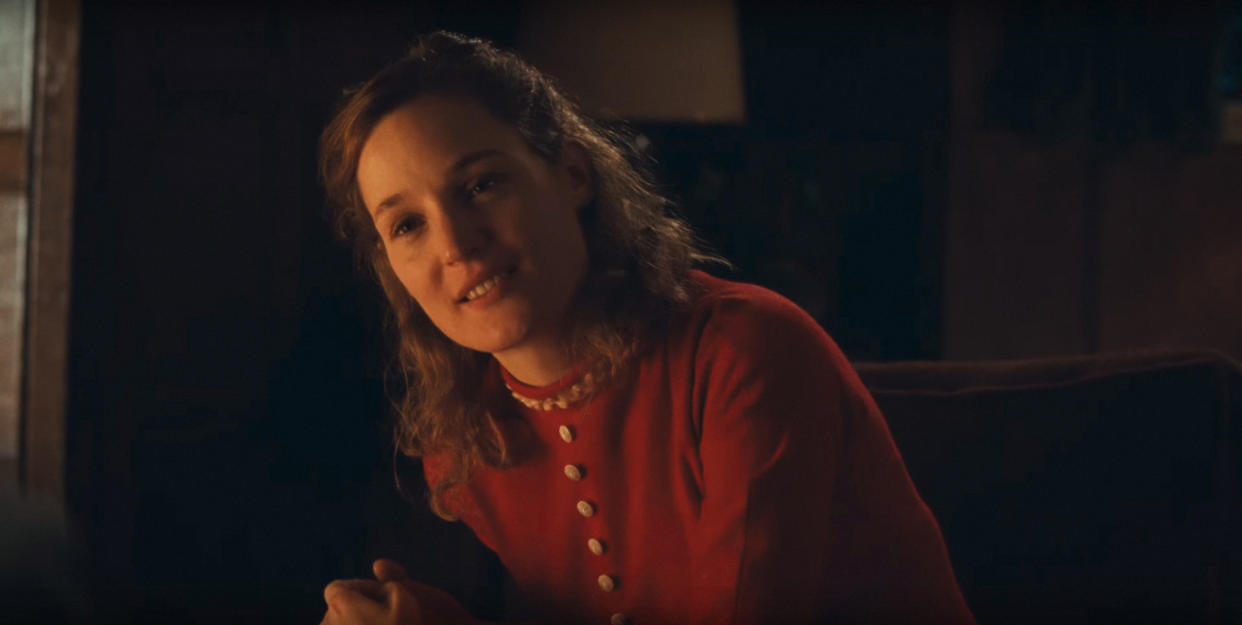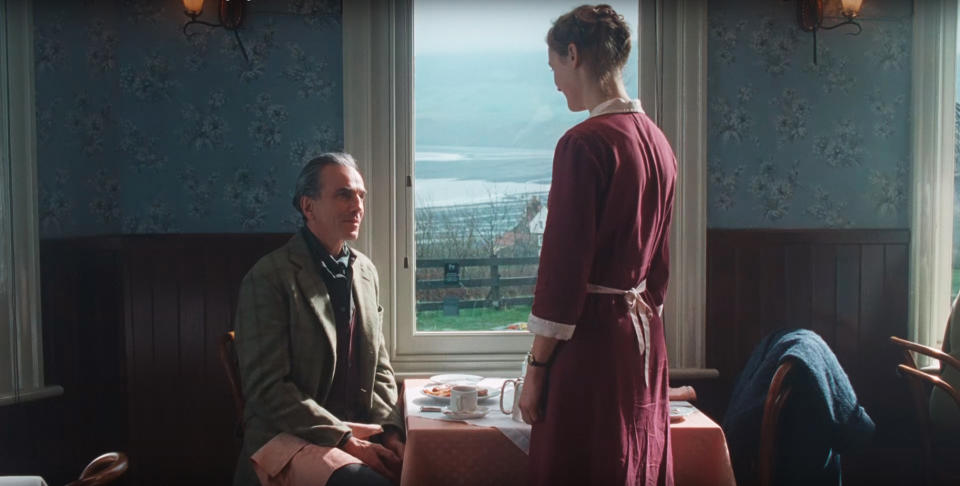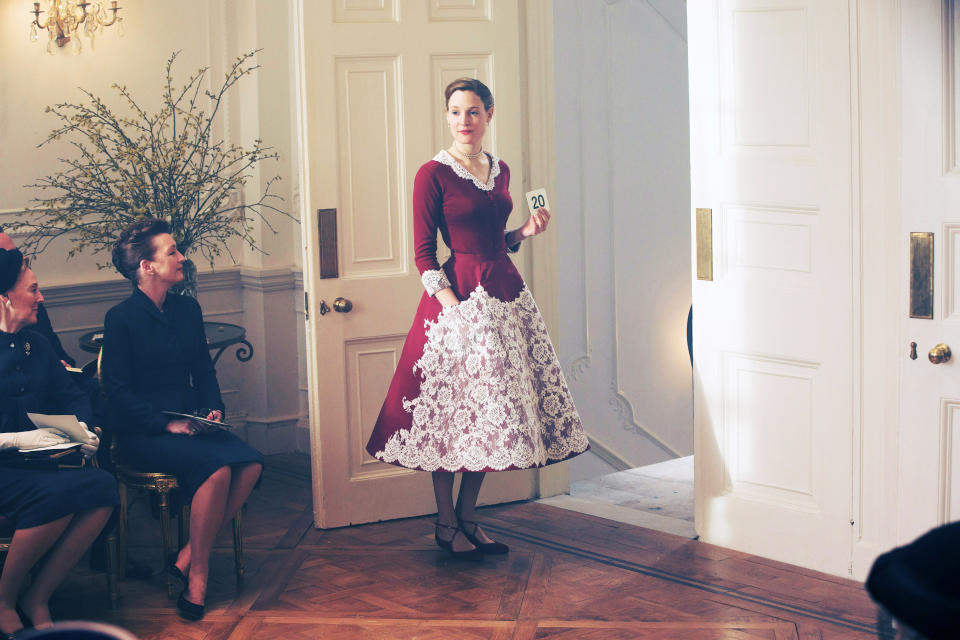Daniel Day-Who? Meet Vicky Krieps, the secret star of 'Phantom Thread'

Daniel Day-Lewis’s announced retirement dominated much of the prerelease buzz surrounding Phantom Thread, the celebrated actor’s latest collaboration with his There Will Be Blood director, Paul Thomas Anderson. Now that the intimate period drama is in theaters — it opened in limited release on Christmas Day, with a nationwide rollout to follow on Jan. 19 — maybe we can stop dwelling on its being Day-Lewis’s final film and start celebrating it as the first major English-language showcase for Luxembourg-born actress Vicky Krieps. Anderson reportedly discovered the 34-year-old performer in the 2014 German film The Chambermaid and chose her for the pivotal role of Alma, a quiet young woman who becomes the personal and professional muse of Day-Lewis’s ’50s-era British fashion designer, Reynolds Woodcock, taking up residence in the home he shares with steely sister Cyril (Lesley Manville).
While Woodcock — like the actor playing him — has a dominating presence, one of the joys of Phantom Thread is watching how the balance of power stealthily shifts from him to Alma as their relationship evolves. And, in the process, Krieps herself emerges as the movie’s real star, with her three-time Oscar-winning scene partner almost relegated to supporting-player status. “It’s a funny one, that,” Anderson tells Yahoo Entertainment with an impish grin. “It doesn’t compute with people. They’re like, ‘What do you mean Daniel Day-Lewis is the second banana?’ We’re so used to him being front and center, but he’s so generous in this film. We begin and end the story with Alma, and it’s told through her eyes.”
Not that Krieps hereself would ever boast about reducing Day-Lewis to second-banana status. “I didn’t realize it, you know?” she remarks in a separate interview. “The way it was written, you couldn’t really tell. Then during shooting, I remember realizing that I was working every day and thought, ‘Oh, my God, I think this is kind of Alma’s story!’ Thankfully, Paul didn’t make it only Alma’s story. The way he edited it, it’s Reynolds and Alma’s story, but in a very subtle way.”

Krieps feels that part of the reason why Alma’s centrality to the narrative is only a cumulative realization on the audience’s part is that viewers spend much of the movie uncertain about their feelings toward this interloper in the Woodcocks’ carefully manicured midst. “For a large part of the movie, they don’t like Alma,” she says, matter-of-factly. “They’re like, ‘What’s she doing? It’s strange.’ She’s not the typical object of desire, and she doesn’t seem interested that she’s much younger than he is or that he has more money. She exists somewhere in between all that.”
And because her motivations appear opaque, audiences initially endear themselves to Reynolds and Cyril, whose behavior at least follows distinct patterns, as rigid and even cruel as they may seem. It’s only as the movie progresses that we see just how completely Alma understands her lover’s needs and desires, ultimately pushing him to a climactic emotional breakthrough that results in a darkly funny, and genuinely moving, happily ever after. “It’s only in the end that [audiences] really like her,” Krieps notes. “And I think that’s the most interesting thing about the movie. She’s not the typical hero.”
Day-Lewis, of course, is famous for his deep immersion into the characters he plays, not to mention the times they live in. To play Bill the Butcher in Martin Scorsese’s Gangs of New York, for example, the actor reportedly trained as a butcher and also spoke like a 19th-century gangster even when the cameras weren’t rolling. And for Phantom Thread, he spent a year studying the art and science of haute couture, even re-creating a Balenciaga dress as his graduation project. While Krieps’s own research wasn’t quite as hands-on, it was equally in-depth. “I knew I had to learn a lot about the ’50s and how people behaved. I had to understand how people could be so patient and restrained, because that’s really not me! I’m so not into fashion, either; I was more like a little tomboy growing up, so I learned what I could about the styles of the ’50s through books and movies.”
One other key part of the actress’s preparation was total Day-Lewis related news blackout. “I wanted to forget everything I knew about Daniel and his films. I didn’t Google him or watch any of his movies. I wanted to be pure and open, like a white sheet of paper, so I could be aware and react to his current [presence].” Nevertheless, Krieps couldn’t avoid first-day jitters when she stepped onto set with her co-star. “I remember being very scared, because I hadn’t met him before, and I was going to meet him in character. But I found this strength in me and made it through, step by step.”

Krieps says she felt truly comfortable in Alma’s skin only after shooting the fashion show sequence seen midway through the movie, where London’s elite descend on Woodcock’s home and design studio, where Alma is among the models showing off his latest wares. “I don’t like being looked at, especially not in dresses,” she confesses. “It was really hard for me, and I remember feeling so happy that I made it through the scene and didn’t do anything wrong. That’s when I realized how strong Alma is.”
If audiences are similarly looking for one sequence that helps them unravel the enigma that is Alma, Krieps directs them to an eerie scene late in the movie where she tends to a bedridden Reynolds while he has a vision of his late mother’s ghost observing them silently from the back of the room. It’s a moment that seems directly inspired by the real-life incident that encouraged Anderson to make Phantom Thread: being nursed through an illness by his wife, Maya Rudolph. (In that case, though, no hallucinatory ghosts were present.) More importantly, it’s also the scene where the ever-shifting balance of power between them tilts decisively in Alma’s direction.

“That whole day was very eerie,” Krieps reflects now. “It was if we were also open to ghosts, and yet there were no ghosts. At the same time, the way Paul wrote the scene, it felt so natural. In order to become Alma, I had to constantly blend out things: blend out Reynold’s rudeness, blend out his sister, or blend out my own fears and insecurities. In that scene, I blend out the ghost in order to become a person who can walk across the room and be very caring for who is sick in bed. That’s Alma.”
Phantom Thread is currently playing in limited release and will be in theaters nationwide on Jan. 19. Watch the trailer:
Read more from Yahoo Entertainment:

